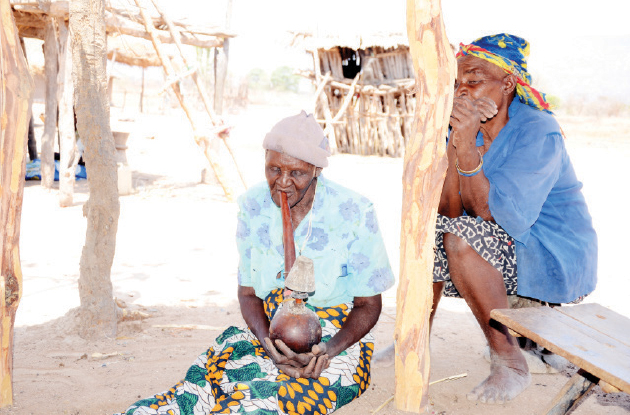An insight into BaTonga culture

Kamangeni Phiri Features Editor
FOR generations, the Tonga people of Binga District in Matabeleland North have seemingly remained stuck in history in their treatment and viewing of ailments. They have a high respect for everything traditional that stems from their being a unique ethnic grouping with a rich culture.
Today, the Tonga or BaTonga still employ traditional herbs to treat a host of ailments that include snake bites, malaria, headaches and fibroids.
However, on August 31 they suffered a cultural shock when one of their tried and tested age-old tradition of treating female sterility went awry resulting in the death of a woman.
Selina Mungade, 33, of Dongamusi Village under Chief Sinakoma bled to death during a traditional mini “surgical operation” meant to remove fibroids. She died on September 8.
Grandmother to the deceased woman’s husband, Matha Muzamba, 71, who conducted the “operation” is now facing a murder charge.
Known in local discourse as kupala injili, the surgical operation only needs a sharp razor blade and an expert elderly woman like Muzamba.
Chief Sinakoma, born Wireless Ngolo 65 years ago, is baffled by the death of Mungande as the process of kupala injili is never known to have fatal results.
He says Tonga people have always had their traditional methods of treating various ailments and conditions. “Surgical removal of fibroids is part of our culture. It’s a traditional method of helping sterile married women become pregnant. However, it is strictly done by the elderly. I don’t know what exactly happened in the case of the Dongamusi woman who died. Maybe they cut the wrong part. I told the family to go to the police when the matter was brought to my court,” said Chief Sinakoma.
To the outside world, the process is hugely known by its misnomer, “female genital mutilation.”
Female genital mutilation or circumcision is the ritual removal of some or all of the external female genitalia.
However, the Tongas’ operation removes fibroids without touching the woman’s private parts like labia. Fibroids are non-cancerous growths that develop in or around the womb (uterus).
The traditional leader described the traditional surgical process as effective despite “the odd death”.
Chief Sinakoma, however, feels kupala injili as a solution to end sterility in today’s world will never appeal to young couples today.
“This practice used to give positive results. The barren would conceive. Today, however, the practice is no longer that popular. It’s a bit outdated. But since it’s a traditional method that used to work so well, we hope it can be taken up by health institutions or doctors to avoid deaths through bleeding. We don’t know who’ll take the initiative,” he said.
The chief’s wife, Esnathi Munkuli, 41, describes kupala injili as a secretive process exclusive to women.
She said while the practice was widely practised in the past, it was difficult to tell its popularity these days.
“It’s not like we advertise that we’ve a problem in conceiving as women. In the past the community was quick to intervene if a couple failed to have a baby within two or so years of marriage. The whole process remained private and confidential. We don’t involve doctors. It’s something that’s only known by the couple and the husband’s parents. The others who’ll be privy to the proceedings are the elderly women who do the operation and are close relatives. It was kept a secret because there was the possibility that the problem could be coming from other members of the community,” said Munkuli.
Binga District Administrator, Lydia Banda-Ndethi said the culture of “genital mutilation” is taking women empowerment backwards.
“Blaming one part when it takes two people to make a child isn’t fair. Men drink lots of beer and this can affect their performance in the bedroom resulting in them facing challenges to bear children,” she said.
While the practice has drawn the ire of women activists, Munkuli sees the whole issue differently.
She said every woman’s dream was to have a baby of her own.
Munkuli says the process is neither painful nor embarrassing to the woman.
She explains: “As a woman I want a child as much as the man. Isn’t that the reason for marrying in the first place? So if there’s something that community or elders could do to help the woman conceive, then so be it. This operation is only for those facing challenges in conceiving, not every woman. It’s a short operation and it doesn’t take time”.
Munkuli said Binga district has many expert female surgeons who have helped women on numerous occasions.
One such expert is Saria Muyinde, 85, a respected village “surgeon” in Chibbabba Village under Chief Sinakoma’s area.
In her time she has helped many sterile women conceive by removing fibroids through a mini-surgical operation.
Muyinde’s surgical instrument is just a razor blade. “If a couple goes for a long time, say two to three years, without having a child, we look at the woman first. If she has a problem, we operate her. If the problem persists we take a relook at the woman and do a second operation. It’s possible that we could leave part of the growth in the woman during the operation. It’s this growth that affects the man’s manhood to penetrate well the female organ. There should be easy passage of the man’s sperms into the ovaries.
“If the problem persists after a second operation then it means the man could be the one with a fertility problem,” she said.
Interestingly, the reason for the women using a new razor blade has nothing to do with hygiene.
Muyinde says no herbs or medication is applied to the surgical wound.
The wound, she explains, can only be healed through the woman having sex with her husband immediately after the operation.
“A new razor blade is sharp and effective. It reduces the pain on the woman. The bleeding and healing of the wound comes about when the woman has sex with her husband,” said Muyinde.
The octogenarian expressed confidence in the Tonga traditional methods of treating ailments.
She says the removing of fibroids using a razor blade has worked so well for the Tonga people for generations.
Muyinde, however, warned of the dangers of mistiming the whole operation. “This has to be done just before the woman’s monthly period. The woman’s husband has to be nearby as well so that the two can quickly have sex after the operation. That way the results will be positive. Our methods are effective. We can treat headaches for example using chobankonondo, a local thorny tree. We hook a vein in the arm and the headache lessens. You need to be an expert to do this,” she said.
Another local “surgeon” from the same village, Lebeka Munkuli, 66, said deaths were rare in the fibroid removal surgical operations.
“This is something that we’ve done for centuries. The death in Dongamusi had nothing to do with the operation or mistiming of the operation as people are saying. It’s said the woman had a problem with her stomach. She had stomach pains and this could have contributed to her unfortunate death. The woman who conducted the operation is a highly respected expert, one of the best in our community. She has helped a lot of woman in the past to conceive,” said Lebeka Munkuli.
Simwami 8 Village head, Polish Muchimba, dismissed outsiders’ view that the fibroid surgical operation was an “insult to womanhood”.
He said the Tongas had more respect of their women as they were more of a matriarchal society.
“We screen both the woman and the man. But it’s the woman first then the man. If there’s nothing wrong with the woman then the old women would inform the old men of the family to take a look at their son. After years of marriage without a child people start talking. Even at beerhalls people will start laughing at you, ‘how can you play soccer and fail to score?’ they would mockingly ask,” said Muchimba.
Vaidah Mashangwa, Bulawayo’s Provincial Development Officer in the Ministry of Women Affairs, Gender and Community Development described the practice of removing fibroids as risky.
She said the government through the Gender ministry had carried out a lot of awareness programmes to inform communities on gender issues, including harmful cultural practices.
“This practice isn’t only done in Binga. It’s also done in some parts of Mashonaland. Doctors use instruments that are sterilised. The cultural way lacks verification. The woman isn’t examined. How trained are the women who do these operations? If there was a death recorded during such a traditional operation then it means there is a gap that should be closed. It’s a shame that society is always quick to blame the woman in cases of infertility yet we’ve some men with a low sperm count. People should use hospitals always,” she said.
Matabeleland North Provincial Medical Director Dr Nyasha Masaka said he was not aware there was a death recorded in Binga. He said he will engage the Binga District Medical Officer and work out ways of helping the community.
“We’ll see how best we can help the community without interfering with culture,” said Dr Masaka.
Chief Sinakoma blamed the media for exposing a process that was supposed to be secretive and confidential.
“It’s a practice for women by women and it should be done in secret. This time it came into the open because there was a death. Because of education and books, you now want to have every detail explained. Even us as men there are certain things that we do if we’ve challenges in conceiving. You take some herbs to strengthen yourself.
“People need to understand us as a people. There are a number of issues written or said about us that aren’t true. People from other parts of the country, for example, think you can freely access and smoke mbanje when in Binga, yet this isn’t true. Our smoking pipes are filled with tobacco not mbanje,” said the chief.
Basilwizi Trust, a local organisation that promotes and safeguards Tonga culture, said kupala injili had no equivalent in English, hence the little understanding of it by outsiders.
The Trust’s director, Frank Mudimba, believes kupala injili like any other traditional practice, was effective.
“Culture is dynamic. However, kupala injili was never part of our culture but one of our traditional ways of treating a condition or ailment. Some people seek medical attention at health institutions. It’s very rare to hear about these things nowadays. It was a traditional medical operation meant to help women facing challenges of conceiving. If it was culture every woman would be doing it,” he said.
Mudimba said every other ethnic grouping has its own ways of helping prepare the girl child in life.
“As an organisation we’re very cognisant of the value of traditional medicines and their effectiveness. We can’t blindly say stop using traditional medicines but in cases where one isn’t sure we encourage them to seek help from modern medicine. We’ve a lot of very useful traditional medicines. For example, we’ve had malaria for hundreds of years here but we always use traditional medicines to treat it. We also don’t need anti-venom for snake bites. We use local medicine. Besides there’re user fees to deal with at hospitals,” he said.











Comments